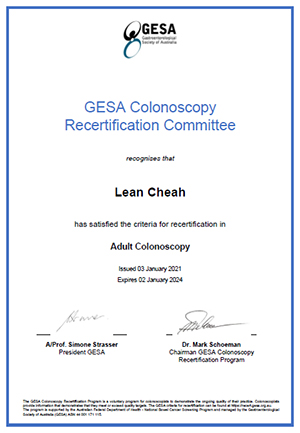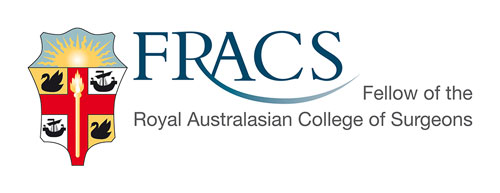BOWEL CANCER
Colo-rectal cancer is the commonest cancer in our society(apart from skin cancers) . Approximately 1 in 18 man and 1 in 26 woman will develop colorectal cancer.
CAUSES / RISK FACTORS
1. Age - Bowel cancer increases with age. The risk is small below the age of 40 but starts to increase exponentially from then.
2. Past history of bowel cancer or benign tumours(adenoma)
3. Family history - having a first-degree relative(eg parent or sibling) would increase one's risks two-to-three times. There are also familial types of bowel cancer such as those with Familial Adenomatous Polyposis(FAP) and Hereditary Non-polyposis Colorectal Cancer(HNPCC).
4. Environmental factors - Western diet high in fat and red meat but low in fibre, low calcium, low selenium, low folate has also been weakly linked to the development of bowel cancer
5. Long-standing inflammation of the bowel especially ulcerative colitis
6. Smoking (This is yet another cancer that is unfortunately more common with smokers)
SCREENING
Most bowel cancer develops over slowely over time. Initially it starts as a benign polyp which over the course of years undergo different mutations within its cells until cancer develops. Unfortunately many cases of bowel cancer do not have any symptoms early on.
Faecal occult blood testing(FOBT) can detect blood loss that is not visible to the human eye and colonscopy can detect and treat the polyps at an early and hopefully benign stage.
Currently the goverment has started the National Bowel Cancer Screening program. People turning 55 or 65 from 1 May 2006 to 30 June 2008 will be sent an invitation pack which includes the FOBT kit(this contains an immunochemical FOBT called Detect) within 3 months of their birthday. Studies from overseas have shown that screening with FOBT every 2 years can reduce the risk of dying from bowel cancer by a third. (Limitations have been placed on the number screened because of the costs and availability of colonoscopy through the public Medicare system - current average public waiting time for a colonoscopy in Victoria is just over 90 days even without the added number of cases from this screening program)
Members of the public can also purchase an alternative immunochemical FOBT called InSure for about $30. This can be purchased online via the www.enterix.com.au website.
It is important that you discuss this with a medical doctor. A positve FOBT would require further investigations with a colonoscopy.
SYMPTOMS AND SIGNS OF BOWEL CANCER
1. Change in bowel action - constipation/diarrhoea/alternating between diarrhoea and constipation
2. Rectal bleeding especially blood mixed with stools
3. Abdominal pain
4. Feeling of incomplete emptying(tenesmus), passage of mucus in stools(Rectal cancer)
5. Feeling tired, lethargic
6. Anaemia - eg found on blood examination
7. Enlarged liver from metastasis to the liver
INVESTIGATIONS
1. Colonoscopy - in order to obtain biopsies to confirm the diagnosis and also look for other polyps in the bowel(there is a small risk that there can be more than one tumour)
2. Barium or Gastrograffin enema - the latter especially in cases of large bowel obstruction to confirm the diagnosis. Typically, the bowel cancer around the narrowed bowel looks like the outline of an apple-core.
TREATMENT
1. Surgery - This involves resecting the bowel and immediate draining lymph glands. (There are various types depending on the location - eg Right hemicolectomy for a right-sided cancer, anterior resection for a rectal cancer, sigmoid colectomy for a cancer in the sigmoid colon). This can be done either with a long incision or laparoscopically-assisted(initially key-hole followed by a shorter open cut). Occasionally a colostomy may be required (eg in cases of large bowel obstruction on the sigmoid colon) or a loop ileostomy (eg in a low anterior resection).
2. Polypectomy - Early bowel cancer that is within a pedunculated polyp may be adequately treated by removal of the polyp alone during the colonoscopy
3. Stenting - this is for selected cases of large bowel obstruction. This is done through a colonoscope and under X-ray guidance. There is a greater risk of perforation, ongoing bleeding/ingrowth from the tumour and migration of the stent.
4. Chemotherapy and radiotherapy - in selected cases of rectal cancer, this may be the best option initially to shrink down the tumour and improve chances of cure from surgery. This may also be neccessary in some cases of bowel cancer even after curative surgery.
Notable cases:
Middle-aged gentleman with change in bowel action. On colonoscopy found to have bowel cancer in the upper rectum and also another polyp in the right side of the colon which turned out to be a cancer as well. He needed bowel resection in 2 places.
Woman in late 40s with long-standing bleeding attributed to haemorrhoids. Presents with anaemia. Found to have an enlarged liver. On CT scan - multiple liver nodules. Colonoscopy was performed and the cancer was stented. She went on to have palliative chemotherapy.


